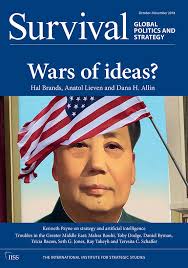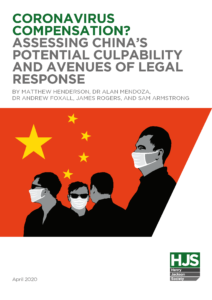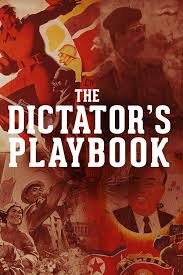 An internal Chinese report warns that Beijing faces a rising wave of hostility in the wake of the coronavirus outbreak that could tip relations with the United States into confrontation, people familiar with the paper told Reuters:
An internal Chinese report warns that Beijing faces a rising wave of hostility in the wake of the coronavirus outbreak that could tip relations with the United States into confrontation, people familiar with the paper told Reuters:
The report, presented early last month by the Ministry of State Security to top Beijing leaders including President Xi Jinping, concluded that global anti-China sentiment is at its highest since the 1989 Tiananmen Square crackdown, the sources said. As a result, Beijing faces a wave of anti-China sentiment led by the United States in the aftermath of the pandemic and needs to be prepared in a worst-case scenario for armed confrontation between the two global powers, according to people familiar with the report’s content, who declined to be identified given the sensitivity of the matter.
Washington views China’s rise as an economic and national security threat and a challenge to Western democracies, while the United States was aiming to undercut the ruling Communist Party by undermining public confidence, said the report by the China Institutes of Contemporary International Relations (CICIR), a think tank affiliated with the Ministry of State Security, China’s top intelligence body.
 In times of crisis, global rivalries tend to intensify rather than abate. Covid-19 will be no different, accelerating existing geopolitical trends, such as the US-China trade war, and bringing to the surface developments that had largely gone unnoticed, says a new report from the Economist Intelligence Unit.
In times of crisis, global rivalries tend to intensify rather than abate. Covid-19 will be no different, accelerating existing geopolitical trends, such as the US-China trade war, and bringing to the surface developments that had largely gone unnoticed, says a new report from the Economist Intelligence Unit.
Yet despite the best efforts of ideological warriors in Beijing and Washington, the uncomfortable truth is that China and the United States are both likely to emerge from this crisis significantly diminished, argues Kevin Rudd, former Prime Minister of Australia and President of the Asia Society Policy Institute in New York.
Neither a new Pax Sinica nor a renewed Pax Americana will rise from the ruins. Rather, both powers will be weakened, at home and abroad. And the result will be a continued slow but steady drift toward international anarchy across everything from international security to trade to pandemic management, he writes for Foreign Affairs. With nobody directing traffic, various forms of rampant nationalism are taking the place of order and cooperation. The chaotic nature of national and global responses to the pandemic thus stands as a warning of what could come on an even broader scale.
For several years, American national security elites have mostly called for a more competitive strategy toward China, while the American people have not been so certain, says Hal Brands, the Henry Kissinger Distinguished Professor at Johns Hopkins University’s School of Advanced International Studies. Now the coronavirus has convinced many Americans that the Chinese government poses not just some nebulous threat to the U.S.-led international order, but a direct danger to their prosperity and well-being. Yet the coronavirus is also threatening to put the U.S. at a strategic disadvantage, he writes for Bloomberg. And yet…
….there are plenty of elements of U.S.-China competition that don’t require huge military expenditures: Creating alternatives for countries that might otherwise have to rely on Chinese loans or technology, hardening free societies against authoritarian interference by developing better techniques for exposing and countering disinformation, and reinforcing the economic and diplomatic relationships among the world’s democracies, to name a few.
 The European Union is expected to issue a warning (Reuters/HT:CFR) against alignment with China and Russia at a virtual summit today with Balkan nations seeking membership in the bloc. China and Russia sent doctors and medical supplies to Bosnia and Serbia in March, while the EU provided $3.6 billion worth of aid amid the coronavirus crisis.
The European Union is expected to issue a warning (Reuters/HT:CFR) against alignment with China and Russia at a virtual summit today with Balkan nations seeking membership in the bloc. China and Russia sent doctors and medical supplies to Bosnia and Serbia in March, while the EU provided $3.6 billion worth of aid amid the coronavirus crisis.
Convincing the world that freedom is worth it will be a hard struggle if Beijing sells its message right, analyst Diana Fu writes in China Has a Playbook for Managing Coronavirus Chaos, an article for Foreign Policy.







